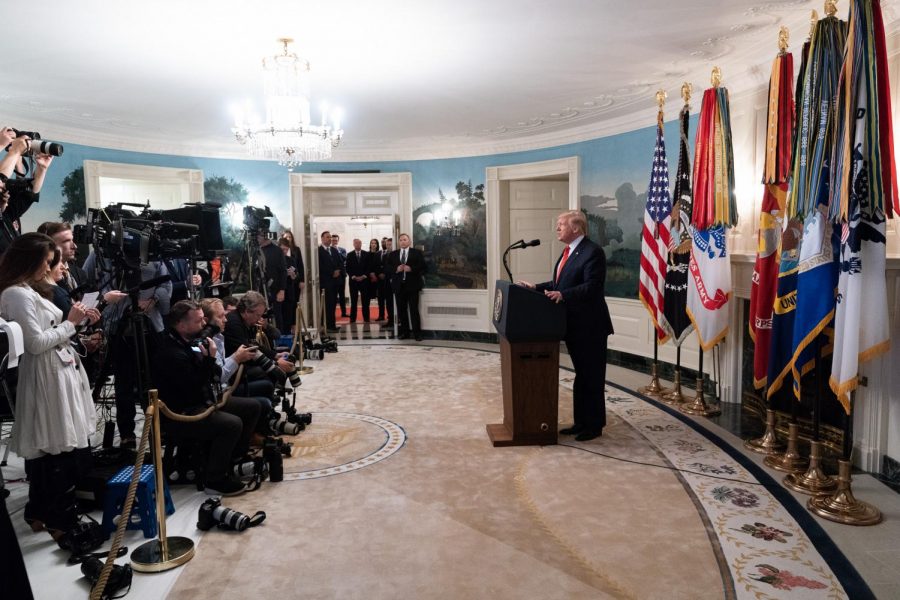ISIS leader killed in Special Forces raid
Trump announces details of the mission to the press in the Diplomatic Reception Room of the White House.
For years ISIS has ravaged the Middle East, killing thousands while also destroying countless homes and priceless artifacts. But, on the night of Oct. 26, ISIS leader Abu Bakr al-Baghdadi was killed in a raid carried out by U.S. Special Forces. Soon after, Abu Ibrahim al-Hashimi al-Qurashi was named the new leader of ISIS, but the loss of al-Baghdadi has drastically slowed ISIS’s efforts to expand.
According to CBS News, eight U.S. military helicopters flew low and fast through the Syrian desert on Oct. 26 to reach Baghdadi’s compound. When they reached their target, 50 Special Forces personnel commenced the raid. They breached the walls with explosives and stormed the compound.
Once Baghdadi knew that he was in danger, he ran into a dead-end tunnel with two of his children. Special forces then released dogs to pursue him. Before the dogs could reach him, Baghdadi blew himself and his two children up with a suicide vest. DNA taken from the raid confirmed that the target was truly Abu Bakr al-Baghdadi.
In a press conference at the White House, President Donald Trump praised the special forces who brought Baghdadi to justice.
“The U.S. special forces carried out a dangerous and daring nighttime raid in northwestern Syria and accomplished their mission in grand style,” Trump said.
Trump also noted that this success does not signal the end of conflict with ISIS.
“We will continue to pursue the remaining ISIS terrorists to their brutal end; that also goes to other terrorist organizations,” Trump said.
This raid comes as a surprise after Trump announced he would withdraw American troops from Syria. ISIS forces were expected to grow stronger without a U.S. presence in the area. However, sustained attacks on the terrorist organization have severely weakened their strength in the Middle East. ISIS went from having control of large cities in Syria to hiding from coalition forces.
Abu Bakr al-Baghdadi was named the caliph of ISIS in June 2014, after the previous leader, Abu Omar al-Baghdadi, was killed. Since then, the group has committed numerous war crimes and countless terrorist attacks. ISIS was responsible for the Charlie Hebdo shooting in 2015 where 12 people were killed and 11 others were wounded. They also beheaded American journalists James Foley and Steven Sotloff. Trump specifically referenced these killings in his press release.
“This attack definitely left a noticeable impact on ISIS and surely slowed them down, especially now as they’ve been weakened for years,” said first-year Guilford student Andrew Song.
No U.S. troops were injured or killed in the skirmish with terrorist forces. However, one attack dog sustained minor injuries after Baghdadi ignited his suicide vest while the dog was in pursuit. Conan, a Belgian Malinois, has made a full recovery and is expected to return to action very soon.
Because of Conan’s courage in the line of duty, Conan has been invited to the White House to meet the president sometime soon. However, Conan cannot receive the Purple Heart or other honors because combat animals are not eligible to receive military decorations.
“I am glad the dog is okay, but I definitely think Conan should be eligible for an award considering the danger of the situation,” said Ellie Schmidt, a first-year student.
Through coordination and relentless pursuit, ISIS has been weakened, leaving them far past their prime. The killing of Abu Bakr al-Baghdadi is reflective of the diminishing power of ISIS. Many hope the organization will soon cease to exist, leading to peace in the Middle East.
Editor’s note: This story originally was published in Volume 106, Issue 5 of The Guilfordian on Nov. 8 2019.











